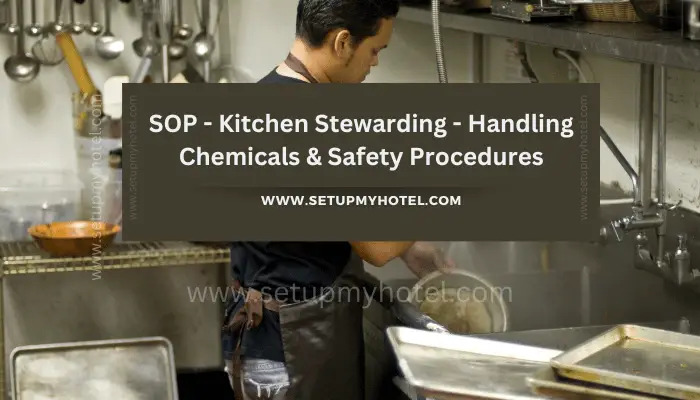Stewarding SOP for Chemical Handling and Safety
Purpose of this SOP:
All steward staff must understand and comprehend the proper procedure of chemicals and safety. Also, InventoryDefinition of Inventory in Hotel Operation? Inventory is the stocks of merchandise; operating suppli... for a chemical should be taken on a monthly or weekly basis and ensure all stewarding staff understand the policy and procedure of chemical inventory.
The Executive Chef and Stewarding Manager should be responsible for ensuring that appropriate kitchen equipment cleaning and maintenance methods are followed by the stewarding staff. The hotel training and HRD department should develop and implement proper written Kitchen Stewarding SOP’s to ensure the same is implemented correctly throughout all the food preparation outlets.
SafetySafety is a condition in which persons are safe from injury; hurt; or loss while present in the work... Tips and Do’s and Dont’s while handling chemicals:
Note: This SOP is for reference or example only, always follow the instructions provided by the manufacturer for your and others’ safety, and also to avoid any injury while operating this equipment.
- Use safety tools according to the correct usage procedure: Hand gloves, Noise masker, Safety shoes, Uniform, and Apron.
- Avoid bodily contact with the chemicals.
- Label the chemicals properly to prevent misuse.
- Replace the uniform immediately after contact with chemicals.
- Avoid inhaling smoke/steam/odour stemming from chemicals.
- Read the user manual on the label.
- Do not attempt to guess the usage of any chemicals.
- All chemical products must be stored and labelled according to the instructions on the safety sheet.
- Chemicals must not be stored together with inflammable material and gas cylinders.
- Do not store acids and alkalis together.
- Do not store strong acids and organic substances together.
- Do not store strongly oxidizing substances together with oxidizable substances.
- Ethers and other peroxide building substances must be stored in the dark and cool, in tightly sealed containers.
- Chemical containers must be stored with closed lids when they are not being used.
- Commit chemical inventory at the end of the month.
- Inventory measurements should be accurate.
- Familiarize yourself with how to account for different types of chemicals such as powder or liquid. List of Kitchen Cleaning Chemicals.
First Aid for Chemical Injuries or Burns:
- Any direct contact with the eye must be treated immediately: wash with flowing cold water for at least 15 minutes and report to the Supervisor.
- Rinse with as much water as possible if your skin is in direct contact with chemicals, particularly the acid/corrosive ones.
- Try to remove the chemical and contaminated clothing from contact with the skin and eyes, but be very careful not to touch or spread the chemical as this could lead to further injuries to the victim or the person helping them.
- Use gloves or other protective materials to cover hands and, if possible, carefully cut away clothing such as T-shirts, rather than pulling them off over the head.
- Do not wipe the skin as this may spread contamination.
- If the chemical is dry, brush it off the skin.
- Rinse continuously with clean water
- Rinse the affected area continuously with clean water as soon as possible to remove any residual chemicals.
- Try to make sure the water can run off of the affected area without pooling on the skin and potentially spreading the chemical to a wider area.
- Only use water, do not rub or wipe the area.
- Collect safety chemicals data to know the characteristics of the chemicals.
- Immediately consult a doctor for the next course of action.
Training Summary questions:
Q1. What is the purpose of this SOP?
Q2. What are the safety tools that need to be used while handling chemicals?
Q3. Why it is important to treat direct contact with the eye immediately?
Q4. Is it OK to wipe the affected area of the skin?
Q5. Why it is important to label the chemicals?
SOP Number: Kitchen / F&B Production SOP – 41 Department: Stewarding Staff Date Issued: 5-Mar-2019 Time to Train: 30 Minutes











